新概念英语第一册73-74—The way to King Street
新概念英语一Lesson73-74
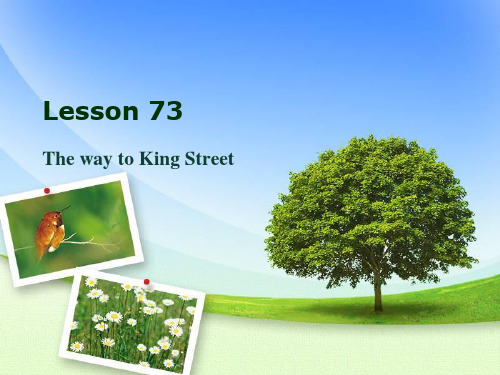
用动词的适当形式填空 1.He goes (go) to the zoo on Sundays. 2. Do they like (like) China? 3.Lucy doesn't like(not like)meat at all. 4.The students have (have) lunch at home everyday. 5.My father often walks(walk) in the park. 6.Mother gets (get) up early in the morning. 7.He doesn't do(not do) his homework at lunch. 8. Do you always clean (clean) teeth after meal? 9.The sun rises (rise) in the east. 10.The moon moves (move) round the earth.
lose
I do not know London very well, and I will lost my way. know …well 对……了解
我对他不是很了解。
I don’t know him very well. and 此处指的是“因此,所以” Come upstairs and see it.
Lesson 73
The way to King Street
Big Ben
London Bridge
flag
Last week, go ls went to London.
She does not know London very well, and she ________________ lost her way.
新概念英语第一册第73-74课-The way to King
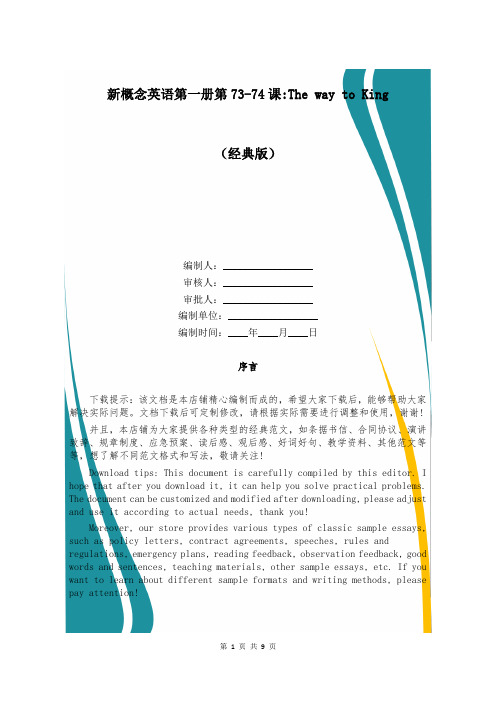
新概念英语第一册第73-74课:The way to King(经典版)编制人:__________________审核人:__________________审批人:__________________编制单位:__________________编制时间:____年____月____日序言下载提示:该文档是本店铺精心编制而成的,希望大家下载后,能够帮助大家解决实际问题。
文档下载后可定制修改,请根据实际需要进行调整和使用,谢谢!并且,本店铺为大家提供各种类型的经典范文,如条据书信、合同协议、演讲致辞、规章制度、应急预案、读后感、观后感、好词好句、教学资料、其他范文等等,想了解不同范文格式和写法,敬请关注!Download tips: This document is carefully compiled by this editor. I hope that after you download it, it can help you solve practical problems. The document can be customized and modified after downloading, please adjust and use it according to actual needs, thank you!Moreover, our store provides various types of classic sample essays, such as policy letters, contract agreements, speeches, rules and regulations, emergency plans, reading feedback, observation feedback, good words and sentences, teaching materials, other sample essays, etc. If you want to learn about different sample formats and writing methods, please pay attention!新概念英语第一册第73-74课:The way to King新概念英语第一册第73-74课:The way to King StreetLesson 73 The way to King Street到国王街的走法Listen to the tape then answer this question。
新概念英语第一册第73-74课:The way to King Street
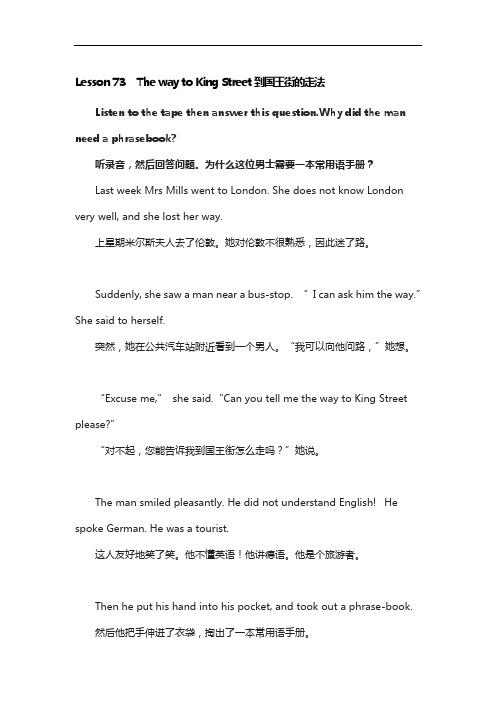
Lesson 73 The way to King Street到国王街的走法Listen to the tape then answer this question.Why did the man need a phrasebook?听录音,然后回答问题。
为什么这位男士需要一本常用语手册?Last week Mrs Mills went to London. She does not know London very well, and she lost her way.上星期米尔斯夫人去了伦敦。
她对伦敦不很熟悉,因此迷了路。
Suddenly, she saw a man near a bus-stop. “I can ask him the way.”She said to herself.突然,她在公共汽车站附近看到一个男人。
“我可以向他问路,”她想。
“Excuse me,”she said.“Can you tell me the way to King Street please?”“对不起,您能告诉我到国王街怎么走吗?”她说。
The man smiled pleasantly. He did not understand English! He spoke German. He was a tourist.这人友好地笑了笑。
他不懂英语!他讲德语。
他是个旅游者。
Then he put his hand into his pocket, and took out a phrase-book.然后他把手伸进了衣袋,掏出了一本常用语手册。
He opened the book and found a phrase. He read the phrase slowly. 他翻开书找到了一条短语。
他缓慢地读着短语。
“I am sorry,”he said. “I do not speak English.””很抱歉,“他说,”我不会讲英语。
新概念英语第一册Lesson73-74讲义和练习题[1]
![新概念英语第一册Lesson73-74讲义和练习题[1]](https://img.taocdn.com/s3/m/8b8b4be1ba4cf7ec4afe04a1b0717fd5360cb28f.png)
新概念英语第一册Lesson73-74讲义和练习题[1]Lesson 73-74 The way to King Street. What did they do?本节课学习重点:不规则动词的一般过去式,一些副词,一般过去式提问:What did they do? New words and expressions:生词和短语1. Week: n. 一周。
相关短语:in a week在一周内;last week上一周;next week下周。
例句:How many days are there in a week?2. London: n. 伦敦。
London is the capital of the UK. (the UK: 全称是the United Kingdom of Great Britain and Northern Ireland 大不列颠及北爱尔兰联合王国)知识拓展:英国著名大学有:Oxford牛津大学;Cambridge University剑桥大学。
“Titanic”泰坦尼克号的处女航,于1912年4月从英国南安普敦出发,原定目的地:纽约。
很不幸的是航行途中撞到冰山沉没,造成空前的海难,1500多人遇难。
名人:莎士比亚,牛顿,伊丽莎白女王,戴安娜王妃,威廉王子,贝克汉姆,费雯丽,奥黛丽赫本,凯特温斯莱特等。
3. Suddenly:adv. 突然地。
sudden: adj.& n. 相关短语:all of a sudden突然地,出乎意料地例句:Suddenly, she looked ten years older.4. bus stop:公共汽车站(小型停靠站,如公交展台)区别:bus station 汽车(总)站,单现代英语,尤其是美式英语里,区别不是太细了。
Airport机场;port港口(Shanghai Port上海港);parking lot停车场5. smile. v. 微笑,(过去式)smiled。
新概念英语第一册第73-74课ppt课件
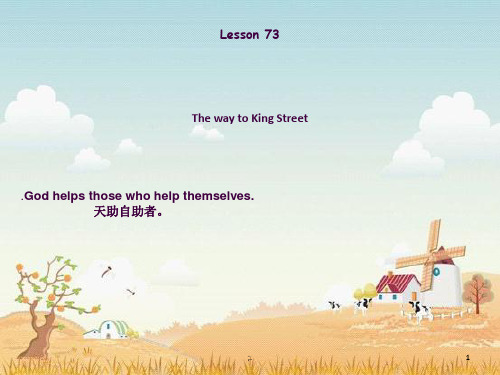
• They worked very hard this morning.
;.
21
• e enjoyed ourselves very much last night.
;.
22
• He swam very well this afternoon.
;.
23
形容词、副词
• 形容词是什么?副词又是什么?我们用一个句子来说明。 She is a good student, and she works hard. 本句中,good 就是形容词,而hard 则是副词
;.
6
• (3)遗失;丢失:
• I can’t enter my house because I’ve lost my key on my way home. • 我进不了自己的房子,因为在回家的路上我把钥匙丢了。
• We lost her in the crowd. • 我们在人群中找不见她了。 • Lose heart失去信心,泄气 • Lost weight减肥 • Lost oneself in沉迷于,迷恋于,专心于 • Be lost in 迷恋于,专心于
;.
11
• 2.问路: Can you tell me the way to ……? How can I get to ……? Where is ……?
;.
12
3.ask sb. sth. 问某人某事。 eg:He asked the teacher a question.
• ask sb for sth向某人要某物 • ask for it=ask for trouble自找麻烦
;.
16
He took a cake and ate it quickly.
新概念一L73-74

1.Where did he go last week ? He went to London .
2.Did she know it very well ?
No,she didn’t
3:Why did the man need a phrasebo Because he didn’t know English.
(冲...微笑) (近距离) The girl is smiling to me.
(对...微笑)(远距离)
V+pleasantly
adj: pleasant : pleasant climate a smiling girl (一个微笑的女孩)
(adj:微笑的) laugh (大笑)(v)
Don't laugh at me. (不要嘲笑我!) I want to have a good laugh.
lose
1)know sb/ sw very well
(非常了解某人/某地)
2)lose one’s way (迷路) 奶奶对北海不是很了解,因此她
常迷路。
My grandma doesn’t know Beihai very well,so she often loses her way.
奶奶刚才迷路了:
say to sb talk to /with sb
Can you ____ it in English ?
Can you _____ in English ?
Can you ____ with your teacher in English ?
6.hands n. eg.饭前要洗手: You must wash your hands before a meal.
新概念英语第一册73-74分析解析
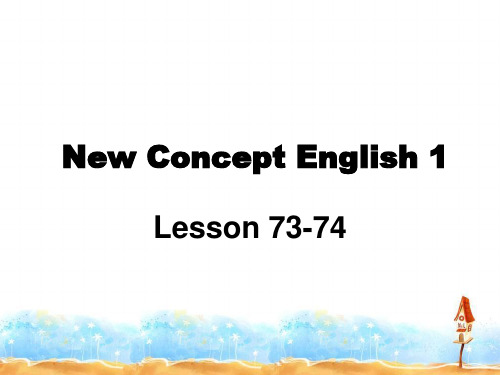
Find out adverbs from the passage:
1.suddenly 突然地 2.pleasantly 愉快地 3.slowly 慢慢地
test
• • • • • • • • • • • • • week London suddenly bus stop smile pleasantly understand speak hand pocket phrasebook phrase slowly • • • • • • • • • • • • • n.周 n.伦敦 adv.突然地 n.公共汽车站 v.微笑 adv.愉快地 v.懂,明白 v.讲,说 n.手 n.衣袋 n.短语手册,常用语手册 n.短语 adv.缓慢地
New Words
★London n.伦敦
London is the capital of Britain. the capital of… …的首都
英国的英文全称:
The United Kingdom of Great Britain and Northern Ireland 大不列颠及北爱尔兰联合王国
Passage
★hand n.手;指针
• put-put(动词和过去式同形) • put…into…把…放进…里
★pocket n.衣袋
零用钱 pocket money • take-took • take out 拿出,取出
★phrasebook
n.短语 手册,常用语手册
Passage
★phrase n.短语 ★slowly adv.缓慢地
Lesson 74 What did they do?
New words:
New Concept English 1 Lesson 73-74
新概念英语第一册第73-74课课件

• 时间和地点副词前面都不能加介词。
3、程度副词:so, very, quite, rather
• 程度副词一般加在形容词或副词前面,加强一种程度。 • enough:足够 good enough • so good, very good
Lesson 73
The way to King Street
.God helps those who help themselves.
天助自助者。
第一页,编辑于星期六:十八点 四分。
…the way( that/in which) +句子 1.I don`t like the way (that/in which)he
office 8.then [adv.] 然后,表示过渡。 • Can you tell me the way to the station? • And then I won`t lose my way if you help me.
第十四页,编辑于星期六:十八点 四分。
Lesson 74 What did they do?
第二十六页,编辑于星期六:十八点 四分。
• 2. 以辅音字母加y结尾的形容词要变y为i,然 后再加-ly。 如:busy-busily; angry-angrily; easy-easily ;happy---happily
• 3、某些以辅音字母加不发音的字母e结尾 和以-ue结尾的形容词要先去掉e,然后再加-y 或-ly。 如: terrible-terribly; true-truly; gentle-gently
• 在一个陌生的城市里,你很容易迷路。
新概念英语第一册73-74课课文详解、翻译及语法
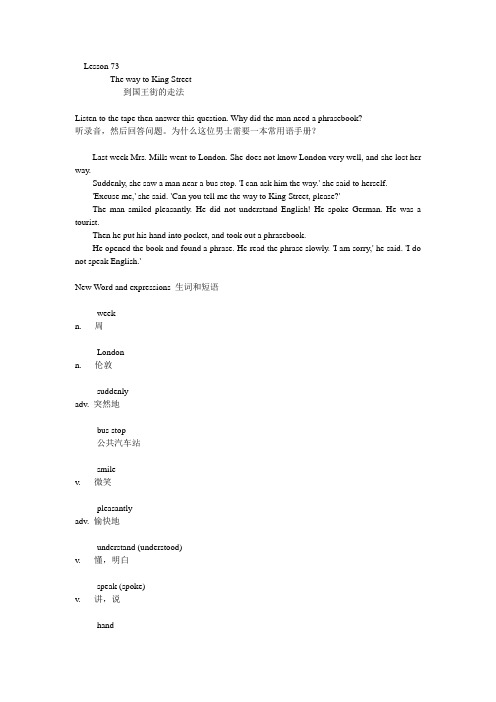
Lesson 73The way to King Street到国王街的走法Listen to the tape then answer this question. Why did the man need a phrasebook?听录音,然后回答问题。
为什么这位男士需要一本常用语手册?Last week Mrs. Mills went to London. She does not know London very well, and she lost her way.Suddenly, she saw a man near a bus stop. 'I can ask him the way.' she said to herself.'Excuse me,' she said. 'Can you tell me the way to King Street, please?'The man smiled pleasantly. He did not understand English! He spoke German. He was a tourist.Then he put his hand into pocket, and took out a phrasebook.He opened the book and found a phrase. He read the phrase slowly. 'I am sorry,' he said. 'I do not speak English.'New Word and expressions 生词和短语weekn. 周Londonn. 伦敦suddenlyadv. 突然地bus stop公共汽车站smilev. 微笑pleasantlyadv. 愉快地understand (understood)v. 懂,明白speak (spoke)v. 讲,说handn. 手pocketn. 衣袋phrasebookn. 短语手册,常用语手册phrasen. 短语slowlyadv. 缓慢地参考译文上星期米尔斯夫人去了伦敦。
Lesson73-74ThewaytoKingStreet(课件)新概念英语第一册【01】

她迷路了。
s po t
st op
stop
停车站
They were at the bus stop.
他们在公共汽车站。
i le sm
sm i le
smile
微笑
She smiled pleasantly.
她友好地笑了笑。
st der un and
un der st and
understand
02.她对伦敦不很熟悉,因此迷了路。
ls
03.突然,他在公共汽车 站附近看到一个男人。
04.“我可以向他问路。”她想。
05.“对不起,您能告诉我到国王街怎么走吗?”她说。 ls
07.他不懂英语! ls
06.这人友好地笑了笑。
08.他讲德语。 09.他是个旅游者。
1. Write the new words six times. 2. Translate the sentences into English. 3. Read the text clearly, loudly and fluently.
New Concept English 1 Lesson 73-74
The bus went slowly yesterday afternoon
and we arrived home late.
They worked very hard this morning.
We enjoyed ourselves very much last night.
He swam very well this afternoon.
03.Suddenly, she saw a man near a bus stop.
新概念英语第一册73-74

New Words
★ smile v. 笑
smile at
smile n. a sweet smile
★smile a…smile
She smiled a pleasant smile. =She smiled pleasantly.
她愉快地笑了。
smile
n. 微笑;笑容
vi. 微笑
laugh
n. 笑,出声的笑; 引人发笑的事或人
• Example: • She smiled _p_lea_s_an_tly_ . (pleasant)
• 1 He read the phrase __sl_ow_ly__ . (slow) • 2 He worked __la_zi_ly__ . (lazy) • 3 He cut himself __b_ad_ly__ . (bad) • 4 He worked _c_ar_ef_ul_ly_ . (careful) • 5 The door opened _s_u_dd_en_ly_ . (sudden)
hurried
• Cut it out.
打住,停住吧! = shut up
• haircut
• action --- cut
★thirstily adv.口渴地 • thirsty adj.口渴的
★greet v.问候,打招呼
• 先找动词再找副词 • 找出副词修饰哪个动词 • 翻译句子
• shave (shaved) vt. 刮胡子 • hurriedly adv. 匆忙地
• He took a cake and ate it quickly.
• eat (ate) • quickly
v.吃 adv.快地
新概念第一册Lesson 73-74课 The way to King Street
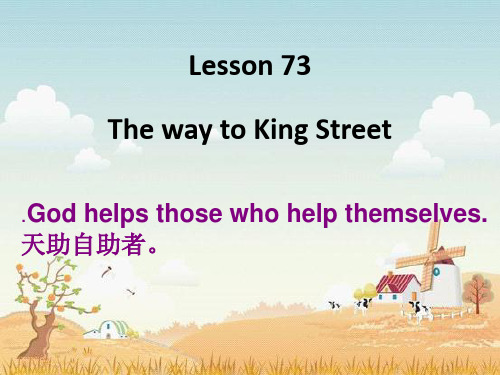
• 3.ask sb. sth. 问某人某事。 • eg:He asked the teacth向某人要某物 • ask for it=ask for trouble自找麻烦
• say-said-said • say to oneself 心中暗想(不出声地) • talk to oneself / think aloud 自言自语(小
It is pleasant today. 给人好感的人
a pleasant person
She smiled a pleasant smile.
=She smiled pleasantly.
★understand (understood) ① v. 理解;懂 我不明白你的意思
v. 懂,明白
I don’t understand what you mean.
• 在我小时,妈妈晚上常给我讲故事。
Exercises: 用speak, say, talk, tell正确 形式填空。
• “How silly of me!” hesaid to himself. • Do you speakChinese? • Look! Our teacher is talking with our parents. • He will tell the good news to everyone in our
• lose one’s way 迷路 • Lose sight of 看不见 • Lose heart失去信心,泄气 • Lost weight减肥 • Lost oneself in沉迷于,迷恋于,专心于 • Be lost in 迷恋于,专心于
Fill in the blanks
• Suddenly, she a man a bus-shop. “ I
新概念英语第一册第73-74课资料
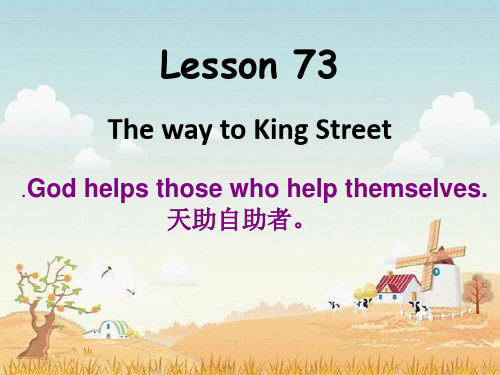
但是way后面不是完整的句子,只能用 that或which引导定语从句
The way that/which I used is wrong
诋毁/说…坏话/说…好话/赞扬
课文讲解
• 1.She does not know London very well, and she lost her way.
• know …well 对……了解 我对他不是很了解。
I don’t know him very well. • and 此处指的是“因此,所以”
★ lose v.
• (1)迷失;(使)迷路: • She did not know London very well, and she lost her way. • 她对伦敦不很熟悉,因此迷了路。 • Its very easy to lose your way in a strange city. • 在一个陌生的城市里,你很容易迷路。 • (2)失去;丧失: • He lost his sight in a car accident. • 他在一起汽车交通事故中失明了。 • She has just lost her job because of carelessness. • 她刚刚因疏忽大意而丢了工作。
形容词、副词
• 形容词是什么?副词又是什么?我们用一个句子来说明。 She is a good student, and she works hard. 本句中,good 就是形容词,而hard 则是副词
• 形容词用来修饰名词或代词, 表示人或事物的性质, 状态, 和特征。
Lesson 73-74 The way to king street新概念一册教师用课件

gave
•drink
• drinks drunk
drinking
• meets meeting
•meet met
•swim •swims •swimming swam
•understand •understands •understanding •understood
watch the flash
•slowly •adv. 缓慢地 •lose vt. 丢失
•过去式;lost
动词的四种形式
•find • finds finding found •lose • loses losing lost •cut • cuts cutting cut •eat • eats eating ate
•give •ives giving
•写出下面规则 动词的过去式
• cook
• rain
•jump
• snow
•remember • arrive
•remain • live
• play
• call
• enjoy
• stop
•dust • sharpen • turn • climb •type •clean
•paint • show • boil • lift •like •want
•What’s the matter with ls?
Lesson 74 words
•hurriedly •adv. 匆忙的 •cut v. 割,切
•thirstily •adv. 口渴的 •go v. 走 •greet v. 问候, 打招呼
adj. adv.
•形容词变副词 •adj.+ly •ly 是副词后缀。
新概念英语第一册73-74课课件

She lost her way.
Where did she see a man?
She saw a man near a bus stop.
What did she say to him?
She said, ’Excuse me .Can you tell me the way to King Street ,please?’
一般过去时
基本结构:主语+动词过去式+其他; 否定形式①was/were + not; ②在行为动词前加didn„t,同时还原行为 动词; 一般疑问句Did+主语+do+其他。
用法
时态
动词 形式
肯定句 否定句
一般现 一般、 原形/ I do… 在时 经常、 三单 He 习惯、 do/do does… 真理 es
Listen
to the tape then answer this question.
What did Mrs. Mills do last week?
She went to London.
Does she know London well?
No, she doesn’t.
What happened to her? (Did she lose her way?)
需注意: friendly; motherly; lovely等词是 形容词而非副词。 在英语中,有些词既可以作形容词,又可以作 副词,如early, much, fast, little, wide, loud等。 由于这类词词性虽不同,但词形却 一样,这就需要大家学会在特定语境中判断 它们各自的词性(adv:副词adj:形容词)。
- 1、下载文档前请自行甄别文档内容的完整性,平台不提供额外的编辑、内容补充、找答案等附加服务。
- 2、"仅部分预览"的文档,不可在线预览部分如存在完整性等问题,可反馈申请退款(可完整预览的文档不适用该条件!)。
- 3、如文档侵犯您的权益,请联系客服反馈,我们会尽快为您处理(人工客服工作时间:9:00-18:30)。
3.某些以辅音字母加不发音的字母e结尾 和以-ue结尾的形容词要先去掉e,然后再
加-ly。
如:
terrible terribly
true
truly
Grammar
• 需注意: friendly; motherly; lovely等词是形 容词而非副词。
• 在英语中,有些词既可以作形容词,又可以作 副词,如early, much, fast, little, wide, loud等。 由于这类词词性虽不同,但词形却一样,这就 需要大家学会在特定语境中判断它们各自 的词性。
quiet-quietly ; pleasant-pleasantly
Grammar
形容词变副词的规则:
2. 以辅音字母加y结尾的形容词要变y为 i,然后再加-ly。
如:
busy
busily
angry angrily
easy
easily
happy happily
Grammar
形容词变副词的规则:
can hear what he said. (adv.)
• 另外,还有一类副词和形容词词义相同,但拼写却 不同,如well和good。
• He speaks good(adj) English. 。 • He speaks English well(adv). 。 • hard---hard late-late good----well
Passage
ask the way 问路 ask sb. sth. 问某人某事。ask sb for sth向某人要某物 say-said say to oneself 心中暗想(不出声地) 反身代词: myself, yourself, himself, herself, itself,ourselves, yourselves, themselves
Suddenly I remembered that I didn't bring my key.
Passage
Excuse me. 打扰一下,劳驾,请问…(事前) I’m sorry. 对不起,很抱歉(事后)
•tell sb. the way to sp. 告诉某人去…的路 •Can you tell me the way to ……?
vi. 笑 laugh at + sb.嘲笑某人
Passage
★hand n.手;指针
• put-put(动词和过去式同形) • put…into…把…放进…里
★pocket n.衣袋
零用钱 pocket money
• take-took • take out 拿出,取出
★phrasebook n.短语 手册,常用语手册
• Example: • She smiled _p_lea_s_an_tly_ . (pleasant)
• 1 He read the phrase __sl_ow_ly__ . (slow) • 2 He worked __la_zi_ly__ . (lazy) • 3 He cut himself __b_ad_ly__ . (bad) • 4 He worked _c_ar_ef_ul_ly_ . (careful) • 5 The door opened _s_u_dd_en_ly_ . (sudden)
New Words
★London n.伦敦
London is the capital of Britain. the capital of… …的首都
英国的英文全称:
The United Kingdom of Great Britain and Northern Ireland 大不列颠及北爱尔兰联合王国
Grammar
• 例句:Thank you very much. (adv.) • There is much water in the river. (adj.) • The music is too loud. Please turn it down. (adj.) • He speaks loud enough. So everyone in the room
New Concept English 1 Lesson 73-74
Warm-up Free talk
About traveling
Lesson 73 The way to King Street
Do you know the way to King Street?
Why did the man need a phrasebook?
• They worked very hard this morning.
• work v. 工作 • hard adv.努力地
• We enjoyed ourselves very much last night.
•
enjoy (enjoyed) v.享受
•
very muchFra bibliotekadv.非常
• He swam very well this afternoon.
New Words
★suddenly adv.突然地 sudden adj.突然的 突然的雨 a sudden rain sudden-suddenly adv.突然地
★suddenly 既可以放在句首,也可以放在句中或 句末。
We were talking on the phone when suddenly the line went dead.
• 先找动词再找副词 • 找出副词修饰哪个动词 • 翻译句子
• shave (shaved) vt. 刮胡子 • hurriedly adv. 匆忙地
• He took a cake and ate it quickly.
• eat (ate) • quickly
v.吃 adv.快地
• I gave him a glass of milk and he drank it thirstily.
Find out adverbs from the passage:
1.suddenly 突然地
2.pleasantly 愉快地
3.slowly 慢慢地
• week • London • suddenly • bus stop • smile • pleasantly • understand • speak • hand • pocket • phrasebook • phrase • slowly
• swim(swam) v. 游泳
• well
adv. 好
形容词、副词
Grammar
She is a good student, and she works hard. 本句中,good 就是形容词,而hard 则是副词。
• 形容词用来修饰名词或代词, 表示人或事物的性质, 状态,和特征。
• 副词是一种用来修饰动词,形容词,副词或全句的词, 说明时间,地点,程度,方式等概念。
Passage
The way to King Street
know …well
对……了解
and 此处指的是“因此,所以”这里的and指的是“目的”
lose-lost
lose one's way 迷路
New Words
★week n. 周
this week, last week等,前面不能加介词 the week before last 上上周 the week after next 下下周
test
• n.周 • n.伦敦 • adv.突然地 • n.公共汽车站 • v.微笑 • adv.愉快地 • v.懂,明白 • v.讲,说 • n.手 • n.衣袋 • n.短语手册,常用语手册 • n.短语 • adv.缓慢地
Lesson 74 What did they do?
New words:
hurriedly
adv.匆忙地
cut (cut)
v.割,切
thirstily
adv.口渴地
go (went)
v.走
greet
v.问候,打招呼
★hurriedly adv.匆忙地 = in a hurry
• hurry n.匆忙
• 我们不得不匆忙的说再见。 • We have to say goodbye in a hurry /
• drink (drank) v.喝
thirst 口渴 thirsty adj 口渴的 thirstily adv 口渴地
I met her in the street the day before yesterday and she greeted me warmly.
greet (greeted) v.问候,打招呼
How can I get to ……? Where is ……?
Passage
★pleasantly adv.愉快地 我们在很愉快地交谈。
★understand (understood) v. 理解;懂得; ★speak(spoke) v.讲,说
speak +language 说某种语言 speak to sb.
hurriedly.
★cut (cut)v.割,切 • 翘课 • cut class
• Cut it out.
打住,停住吧! = shut up
• haircut
• action --- cut
★thirstily adv.口渴地 • thirsty adj.口渴的
★greet v.问候,打招呼
Passage
★phrase n.短语 ★slowly adv.缓慢地
Passage
The way to King Street
